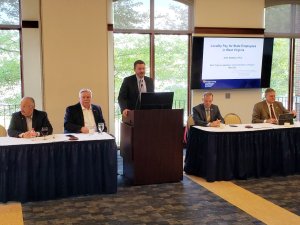CHARLESTON, W.Va. – The 29th annual West Virginia Economic Outlook Conference is planned for Wednesday at the Embassy Suites in downtown Charleston.
WVU Bureau of Business and Economic Research Director John Deskins said the event will include a nationwide forecast with a focus on state opportunities in the post-pandemic economy.

Featured presentations are planned from Deskins, Brian Lego, research professor at WVU BBER, Adam Scavette, regional economist with the Federal Reserve Bank of Richmond, Mark Muchow, deputy cabinet secretary with the state Department of Revenue and Mitch Carmichael, secretary, state Department of Economic Development.
“An overview of the national economy to understand all the things that are happening nationally and how they have a potential to effect West Virginia,” Deskins said. “Then we talk about the state economy from a broad, comprehensive perspective.”
Deskins said recent major announcements from Nucor Steel, Berkshire Hathaway Energy business, SPARKZ and Pure Watercraft are proof the state economy has opportunities. Each of those major announcements have aspects that could incorporated into future efforts to recruit major employers to the state.
“There are several opportunities as overall manufacturing comes back to some extent and grows in the U.S.,” Deskins said. “We have to make sure we’re targeting those opportunities and marketing West Virginia appropriately.”
The health of the national economy and the potential effect on the state will also be explored. Deskins said the state does have some potential to fend off some aspects of a recession, but those opportunities are limited to the energy sector.
“There is some potential for off setting effects, but it’s pretty safe to say that a national recession that could arrive or might already be here by some definition will not be good for our state,” Deskins said.
Looking back, Deskins said the state economy has performed on par with the national economy and expects that to be the case in the future.
“We have about 99-percent, just a little over 99-percent of the jobs we had in January of 2020,” Deskins said. “So, we don’t get an ‘A’ because we’re lagging the nation in terms of COVID, but we’re not far behind.”

